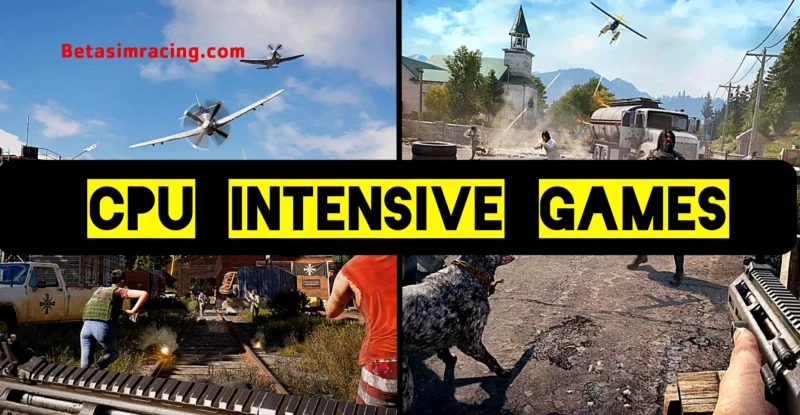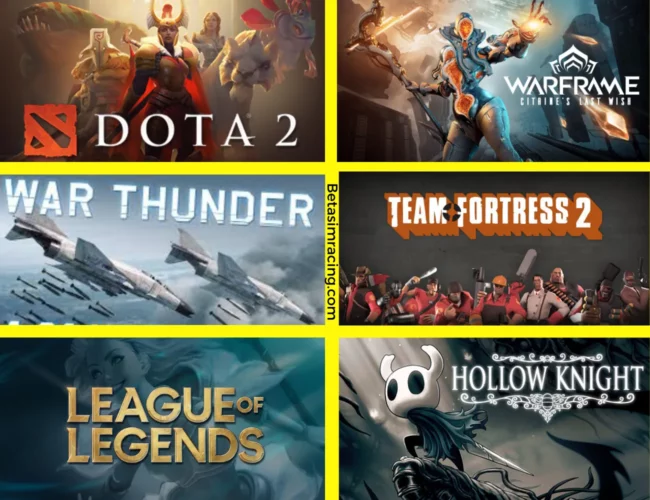I use an Intel Core i9-12900K CPU for gaming. This CPU is a combination of high-performance and high-efficiency cores to deliver excellent gaming performance as well as overall computing power. I have already used AMD Ryzen 9 5950X and the Intel Core i7-12700K.
Based on my experiences, the CPU plays a crucial role in gaming. It handles most of the game’s calculations and processing tasks, such as AI (Artificial Intelligence) calculations, physics calculations, and game logic.
The CPU also manages the game’s networking tasks, such as sending and receiving data from servers and other players. Additionally, the CPU communicates with the GPU (Graphics Processing Unit) to ensure the game runs smoothly and the graphics are rendered correctly.
15 Best CPU Intensive Games + System Requirement
CPU intensive games require a lot of processing power from your computer’s central processing unit (CPU). These games typically feature complex physics engines, advanced artificial intelligence, and large open-world environments, which require a lot of calculations to be performed by the CPU.

Here is CPU intensive games list:
- Cyberpunk 2077
- Assassin’s Creed Valhalla
- Red Dead Redemption 2
- Microsoft Flight Simulator
- Battlefield V
- The Witcher 3: Wild Hunt
- Shadow of the Tomb Raider
- Rainbow Six Siege
- Grand Theft Auto V
- Far Cry 5
- Hitman 2
- Total War: Warhammer II
- Cities: Skylines
- Anno 1800
- Civilization VI
Let’s see how much CPU power these games require to run.
1) Cyberpunk 2077
The amount of CPU power required by Cyberpunk 2077 will depend on various factors, including the specific CPU model, the graphics card, and the resolution and graphics settings used. According to the official system requirements released by CD Project Red, the minimum CPU requirement for Cyberpunk 2077 is an Intel Core i5-3570K or an AMD FX-8310.

However, for a better experience, the recommended CPU is an Intel Core i7-4790 or an AMD Ryzen 3 3200G. Based on various benchmarks and reports, Cyberpunk 2077 can be CPU-intensive, especially in areas with many NPCs or complex AI calculations. Some players have reported high CPU usage, particularly on CPUs with fewer cores or lower clock speeds.
2) Assassin’s Creed Valhalla
Assassin’s Creed Valhalla is a CPU-intensive game requiring significant processing power, especially in crowded areas or during combat. According to the official system requirements, the minimum CPU requirement for Valhalla is an Intel Core i5-4460 or an AMD Ryzen 3 1200. However, for optimal performance, the recommended CPU is an Intel Core i7-6700K or an AMD Ryzen 7 1700.

3) Red Dead Redemption 2
Red Dead Redemption 2 is a graphically intensive game that also requires a significant amount of CPU power to run smoothly. According to the official system requirements, the minimum CPU requirement for the game is an Intel Core i5-2500K or an AMD FX-6300, while the recommended CPU is an Intel Core i7-4770K or an AMD Ryzen 5 1500X.
4) Microsoft Flight Simulator
This extremely demanding game requires a powerful CPU to run smoothly. According to the official system requirements, the minimum CPU requirement for the game is an Intel Core i5-4460 or an AMD Ryzen 3 1200, while the recommended CPU is an Intel Core i5-8400 or an AMD Ryzen 5 1500X.

5) Battlefield V
Battlefield V is a graphically intense game demanding the CPU and GPU. According to the official system requirements, the minimum CPU requirement for the game is an Intel Core i5-6600K or an AMD FX-8350, while the recommended CPU is an Intel Core i7-4790 or an AMD Ryzen 3 1300X.
6) The Witcher 3: Wild Hunt
Wild Hunt is a graphically intense game that requires a moderately powerful CPU to run smoothly. According to the official system requirements, the minimum CPU requirement for the game is an Intel Core i5-2500K or an AMD Phenom II X4 940, while the recommended CPU is an Intel Core i7-3770 or an AMD FX-8350.
7) Shadow of the Tomb Raider
Shadow of the Tomb Raider is a graphically intense game that can require a moderately powerful CPU to run smoothly. According to the official system requirements, the minimum CPU requirement for the game is an Intel Core i3-3220 or an AMD equivalent, while the recommended CPU is an Intel Core i7-4770K or an AMD Ryzen 5 1600.
8) Rainbow Six Siege
Rainbow Six Siege is a competitive multiplayer game that can run smoothly without a particularly powerful CPU. According to the official system requirements, the minimum CPU requirement for the game is an Intel Core i3 560 or an AMD Phenom II X4 945, while the recommended CPU is an Intel Core i5-2500K or an AMD FX-8120. The game’s performance depends more on the GPU and network connection than the CPU.
9) Grand Theft Auto V
Grand Theft Auto V is a graphically intensive game that requires a moderately powerful CPU to run smoothly. According to the official system requirements, the minimum CPU requirement for the game is an Intel Core 2 Quad CPU or an AMD Quad-Core Processor, while the recommended CPU is an Intel Core i5 3470 or an AMD X8 FX-8350.

10) Far Cry 5
Far Cry 5 is a graphically intense game that requires a moderately powerful CPU to run smoothly. According to the official system requirements, the minimum CPU requirement for the game is an Intel Core i5-2400 or an AMD FX-6300, while the recommended CPU is an Intel Core i7-4770 or an AMD Ryzen 5 1600. Higher-end CPUs can perform better, especially in crowded areas or during complex physics calculations.
11) Hitman 2
Hitman 2 is a graphically intensive game requiring a moderately powerful CPU to run smoothly. According to the official system requirements, the minimum CPU requirement for the game is an Intel CPU Core i5-2500K 3.3GHz or an AMD CPU Phenom II X4 940, while the recommended CPU is an Intel CPU Core i7 4790 4 GHz or an AMD CPU Ryzen 5 1600.
12) Total War: Warhammer II
Warhammer II is a CPU-intensive game that requires a moderately powerful processor to run smoothly. According to the official system requirements, the minimum CPU requirement for the game is an Intel Core 2 Duo 3.0 GHz or an AMD Athlon II X4 640, while the recommended CPU is an Intel Core i5-4570 or an AMD FX-8350. Higher-end CPUs can perform better, especially in crowded battles or with more advanced graphics settings.

13) Cities: Skylines
Skylines is a city-building game that can be moderately CPU-intensive, especially when simulating larger and more complex cities. According to the official system requirements, the minimum CPU requirement for the game is an Intel Core 2 Duo E7600 or an AMD Athlon 64 X2 6400+, while the recommended CPU is an Intel Core i5-3470 or an AMD Ryzen 3 1200.
14) Anno 1800
Anno 1800 is a city-building game that can be moderately CPU-intensive, especially when simulating larger and more complex cities. According to the official system requirements, the minimum CPU requirement for the game is an Intel Core i5-3470 or an AMD FX-6350, while the recommended CPU is an Intel Core i5-4690K or an AMD Ryzen 5 1400.
15) Civilization VI
This turn-based strategy game can be moderately CPU-intensive, especially when simulating larger, more complex maps and civilizations. According to the official system requirements, the minimum CPU requirement for the game is an Intel Core i3 2.5 GHz or an AMD Phenom II 2.6 GHz, while the recommended CPU is an Intel Core i5 2.5 GHz or an AMD FX 8350 4.0 GHz.
These games often demand your CPU and may require a high-end processor to run smoothly at high settings. If you have a less powerful CPU, you may need to lower the graphics settings or upgrade your hardware to achieve the best performance.
10 Best Free CPU Intensive Games List
Here is the list of some free CPU-intensive games that anyone can play:

- Dota 2: is an online battle arena (MOBA) game that requires a good CPU to run smoothly.
- League: is also an online battle arena (MOBA) game requiring CPU-intensive gameplay.
- Team Fortress 2: is a popular shooter requiring a decent CPU to run at high settings.
- Warframe: is a fast-paced third-person shooter that can be demanding on your CPU.
- Path of Exile: is a role-playing action game that requires a good CPU to handle the game’s complex mechanics.
- Paladins: is a team-based first-person shooter requiring a decent CPU to run smoothly.
- War Thunder: is a multiplayer combat game that includes air, ground, and naval vehicles, which can be quite demanding on your CPU.
- Smite: is a MOBA game that requires a good CPU to run smoothly at high settings.
- World of Tanks: is a multiplayer combat game that features realistic tank battles and requires a good CPU to handle the game’s physics and graphics.
- Fortnite: is a popular battle game that can be CPU-intensive during gameplay, especially in large multiplayer matches.
10 Best Low CPU Intensive Games List
Now have a look at some less CPU intensive games that anyone can play easily:

- Stardew Valley: It is a relaxing farming simulation game that does not require a powerful CPU to run.
- Minecraft: It is a popular sandbox game that can run on most computers, including those with lower-end CPUs.
- Terraria: It is an action-adventure game with 2D graphics that do not require a powerful CPU.
- Hollow Knight: It is a 2D action platformer with beautiful hand-drawn graphics running smoothly on most computers.
- Bastion: It is a beautiful isometric action RPG with a unique storytelling mechanic that does not require a powerful CPU.
- Limbo: It is a minimalist 2D puzzle platformer that runs smoothly on most computers.
- Braid: It is a puzzle-platform game that requires more brainpower than CPU power.
- Don’t Starve: It is a survival game with a unique art style that runs well on most computers.
- Undertale: It is a unique and charming RPG with retro graphics that do not require a powerful CPU.
- Papers, Please: It is a thought-provoking game where you play as an immigration officer that does not require a powerful CPU to run.
How To Know if a Game is CPU Intensive?
You can determine if a game is CPU-intensive in these ways:
1) Check the System Requirements
You can determine if a game is CPU-intensive is to check the system requirements provided by the game’s developer or publisher. If the game requires a high-end processor, such as an Intel i7 or AMD Ryzen 7, it is likely CPU-intensive.
2) Look for Benchmarks
You can also look for benchmarks or performance tests of the game on various websites, which will show you how the game performs on different CPUs. If the game significantly decreases performance on lower-end CPUs, it is likely CPU-intensive.
3) Consider the Game’s Genre and Graphics
Certain genres of games, such as strategy games or simulation games, tend to be more CPU-intensive than others due to the number of calculations required for the game mechanics. A game with highly detailed graphics or a large open-world environment may also be more CPU-intensive.
4) Monitor Your CPU Usage while Playing
If you are playing a game and notice that your CPU usage is consistently high, it is likely CPU-intensive. You can use a task manager or a third-party monitoring tool to check your CPU usage.
What Makes A Game CPU Intensive?
Several factors can make a game CPU-intensive. These factors involve Graphics, Multiplayer, and more. Check out our list of the factors that make an intensive CPU game.
- AI and Game Logic: If a game has complex artificial intelligence (AI) systems or game mechanics that require a lot of calculations, it can be very CPU-intensive. For example, in a strategy game, the AI needs to calculate a large number of possible moves, which can put a strain on the CPU.
- Physics and Game Engines: Physics calculations and game engines can also be CPU-intensive, especially if the game has a lot of objects or environmental interactions. Games that use physics engines to simulate realistic movements and interactions, such as racing games or flight simulators, can require a lot of processing power.
- Graphics: While graphics are typically more dependent on the GPU, certain effects, such as advanced particle effects or real-time lighting, can strain the CPU. In addition, some games use the CPU for graphics-related tasks, such as rendering complex animations or physics simulations.
- Multiplayer: Multiplayer games can also be CPU-intensive, especially if the game has many players or a lot of action on screen. The CPU must process each player’s movements and actions in real time, which can be a lot of work.
- Open-World Environments: Open-world games with large maps and detailed environments can also be CPU-intensive. The CPU needs to keep track of all the objects and interactions happening in the game world, which can require a lot of processing power.
100% CPU usage is bad for gaming because it can cause performance issues, including stuttering, freezing, and reduced frame rates. When the CPU usage is at 100%, it means the CPU is working at maximum capacity and may not have enough resources left to handle other processes or tasks. This can lead to a bottleneck in the system, causing the game to run poorly. Ideally if you keep your CPU usage below 90% while gaming, it would be best. This allows for some headroom and ensures the CPU can handle other processes and tasks without causing performance issues.
How to Reduce CPU Usage while Gaming?
To reduce CPU usage while gaming, you can try the following:
- Close any unnecessary programs or applications while gaming, as they can take up CPU resources.
- Reducing the graphics settings in the game can also reduce CPU usage, as the CPU has to work less to render the graphics.
- If your CPU consistently hits 100% usage while gaming, you may need to upgrade your hardware, such as getting a newer, more powerful CPU or more RAM.
- Check for any background processes that may take up CPU resources and end them if possible.
You are keeping your CPU usage below 90% while gaming is important to ensure that the system has enough resources to handle other processes and tasks.
CPU intensive games require a significant amount of processing power from the CPU to run smoothly. These games often have complex artificial intelligence systems, physics engines, and graphics that require a lot of calculations and rendering. Multiplayer and open-world games can also be CPU-intensive due to many objects and interactions happening in real-time. High CPU usage can cause performance issues, including stuttering, freezing, and reduced frame rates. It is important to close unnecessary programs, lower graphics settings, and check for background processes that may take up CPU resources to reduce CPU usage while gaming. Upgrading hardware is also necessary for consistently smooth gameplay.
Conclusion

